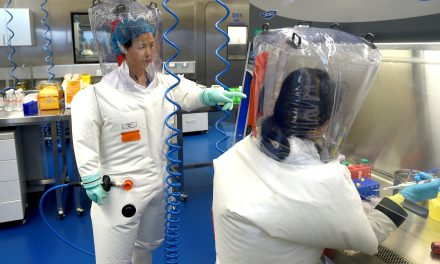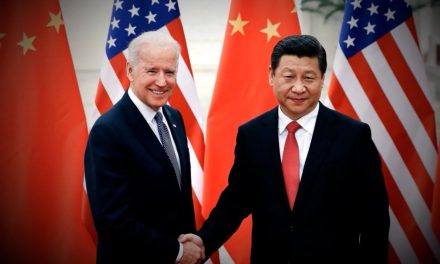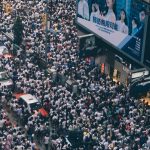BY BRADLEY A. THAYER AND LIANCHAO HAN
Nearly two years since we warned about China’s “biological Chernobyl” — the COVID-19 pandemic — the world has witnessed more than 5.4 million deaths, roughly 15 percent of them Americans. With the omicron variant’s surge and more unknown but inevitable mutations to come, this crisis is far from over. The Biden administration has announced a robust testing regimen for the U.S. population, along with vaccine and mask mandates. Although 500 million rapid tests are good to have, President Biden’s plan to fight the pandemic is inadequate.
No doubt, the U.S. population (and the world’s) must learn to live with this virus. Equally, however, we must find a solution to mitigate its consequences. This remains true no matter the provenance of COVID-19 — whether it occurred naturally, leaked from labs in Wuhan, China, or was deliberately released. The goal should be not only to eradicate the virus and its variants, as the world did with the smallpox virus, but also to develop and prepare a robust capability against future deadly viruses, as well as other diseases.
After the 9/11 terrorist and 2001 anthrax attacks, the U.S. government made great efforts to establish a biodefense system to protect the country from biological and other attacks by initiating Project Bioshield. This included medical countermeasures and building biodefense capability such as diagnostic tests, drugs and vaccines. At the time, President George W. Bush stated: “We refuse to remain idle when modern technology might be turned against us. We will rally the great promise of American science and innovation to confront the greatest danger of our time.”
But nearly two decades and tens of billions of dollars in spending later, our biodefense fails to protect Americans from the current pandemic. Even though the success of the U.S. vaccine rollout is laudable, it remains imperfect and too late for millions of Americans. All vaccines and drugs are still ineffective to prevent infection from COVID-19 and its variants. According to ABC News, between April and November 2021, more than 16,700 vaccinated Americans had died from the disease, and breakthrough cases reached 1.8 million. This is unacceptable; the U.S. must do better.
We must rethink our strategy to build a stronger bioshield for the American people. This could be accomplished by initiating a critical review of the biodefense system, and by reforming and strengthening the Biomedical Advanced Research and Development Authority (BARDA). Past success in dealing with emergencies yields an approach. The Manhattan Project and the Apollo program are two good examples. Both became successful because the government had confidence in American ingenuity. It gathered the best and brightest scientists, technologists and project managers, and allocated sufficient money to solve the most urgent problems at the time.
We think President Biden should learn from Presidents Roosevelt and Kennedy, suspend his legislative agenda, such as Build Back Better, and focus on resolving the current health crisis and ensuring appropriate governmental response so that future viral outbreaks can be contained. This would require assembling a team of the best talents the country can offer and sufficient resources through Emergency Use Authorization (EUA) to eradicate COVID-19. This would place the United States on a course of full economic and social recovery, while building a greater capability for rapid response to chemical, biological, radiological and nuclear (CBRN) agents, pandemics and other emerging infectious diseases.
The public-private partnership model works for most public goods because of the lack of a significant commercial market for CBRN countermeasures. However, when it comes to developing pandemic vaccines and therapies, and implementing vaccinations, a significant number of Americans are still concerned, rightly or wrongly, that Big Pharma may deliver inferior products and lobby the government for their products to get more money from the taxpayers. Insufficient transparency for the BARDA funding process and oversight yields conspiracy theories and helped to reduce the vaccination rate.
In this case, we think it may be better to take for-profit biotechnology and pharmaceutical companies out of the equation. This would permit the government to resume full control of this type of public good and could increase the trust and confidence of the American people. Congress could insert oversight through the Government Accountability Office to closely monitor the government programs.
In addition to these suggested measures, the U.S. government should tap into American ingenuity by creating a “pandemic award” for solutions to eradicate COVID-19, with a significant amount of financial incentive to motivate people to participate and encourage a better investment and research environment for innovations.
The pandemic has cost America hundreds of thousands of valuable lives and trillions of dollars. It is certain to inflict more damage, even if we find ways to mitigate it. Future CBRN agents, pandemics and infectious diseases could be even more dangerous and deadly if we fail to enhance our biodefense and ensure that it is strong enough to protect Americans.
In 1986 at the Chernobyl nuclear plant, a world-threatening crisis occurred when the Soviet Union enabled a horrific situation to unfold — and even today the world must ensure containment of the consequences of that disaster. The Number Four RBMK reactor will remain radioactive for thousands of years and its protective covering must be maintained, requiring permanent vigilance at the site. So it is with pandemics: We need perpetual awareness to guarantee the detection of future viral and other disease outbreaks and rapid protective response.
The U.S. does not appear to have this capability. A lasting legacy of the Biden administration would be to lead in this domain and provide such capability for the U.S. — and perhaps global — population.
This article first appeared in The Hill on 12/29/21 2:30 PM ET
























